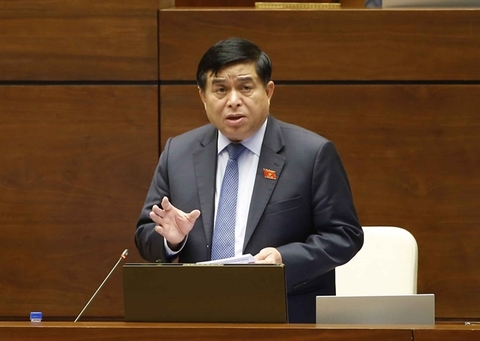
Minister of Planning and Investment Nguyen Chi Dung. — VNA/VNS Photo
Minister of Planning and Investment Nguyen Chi Dung talks to the Government Portal about the ministry’s commitments to supporting start-ups and innovative enterprises.
Can you talk in detail about how the Ministry of Planning and Investment is supporting innovation, start-ups, the operation of the National Innovation Centre, and the start-up support fund?
We’re now witnessing rapid changes regarding technologies and innovation.
Viet Nam aims to reform its economy based on raising its competitiveness and productivity. There are four main pillars: human resources, funding, technology infrastructure and professional innovative centres.
Currently, the Ministry of Planning and Investment is assigned by the Government to formulate the National Strategy on Industrial Revolution 4.0, build the National Innovation Centre (NIC) and connect Vietnamese talents through the Viet Nam Innovation Network, thereby promoting innovation.
The NIC will provide support for start-ups and transfer technologies to small- and medium-sized enterprises in addition to contributing capital to develop new technologies. It is expected that the centre will be completed by the end of 2020. We will also ask the Government to consider a special institutional mechanism for the centre.
The Ministry is also working on building an ecosystem to support innovative enterprises. I think it’s essential to build a network of technology specialists, experts and scientists working in the country and overseas. In the long run, we will organise more training on innovation and start-ups.
The participation of the global innovation fund will provide great support for start-ups to bring their ideas to life.
Viet Nam is attracting a lot of Foreign Direct Investment, but we don’t know about technology transfer. How will this issue be tackled?
Foreign direct investment (FDI) to Viet Nam has made considerable contributions to the State budget, creating jobs and raising the country’s production and export capacity. However, it’s true that there are still problems regarding technology transfer.
The Government will compile a report on a resolution to attract FDI with a careful selection of projects that are environmentally friendly and involve advanced technologies and yield high-added value.
Regarding institutional mechanisms for ventures to operate properly, the Government had spared no efforts to facilitate their business. The decree 38/2018/ND-CP was issued in March last year to regulate venture’s operation with detailed content. Such clear and practical policies will prove to ventures that Viet Nam has a transparent and stable business environment.
Can you talk about the operation of ventures in Viet Nam?
In 2018, there were 3,000 start-ups in Viet Nam and the capital poured into these start-ups has increased significantly. In 2017, 92 start-ups received investments worth US$291 million. In 2018, the number was $889 million.
The Government considers innovation a major motivation and the key to fast and sustainable growth. It has been implementing encouraging policies for start-ups, conducting institutional reforms on venture capital so that funding can reach entrepreneurship in the easiest way. The government has also been formulating and building policies to perfect its innovative eco-system and create the most favourable conditions for innovation.
The ministry of planning and investment has actively made contacts with international venture funds to call on investment for start-ups in Viet Nam. In general, these venture funds have expressed interest in Vietnamese start-ups.
At the Vietnam Venture Summit 2019, large domestic firms like the military-run telecom group Viettel or the private conglomerate Vingroup as well as global big players like Qualcomm, Siemens and Google have also attended and contributed their experience. It was part of a great strategy to bring Viet Nam's innovation ecosystem to a new level. — VNS